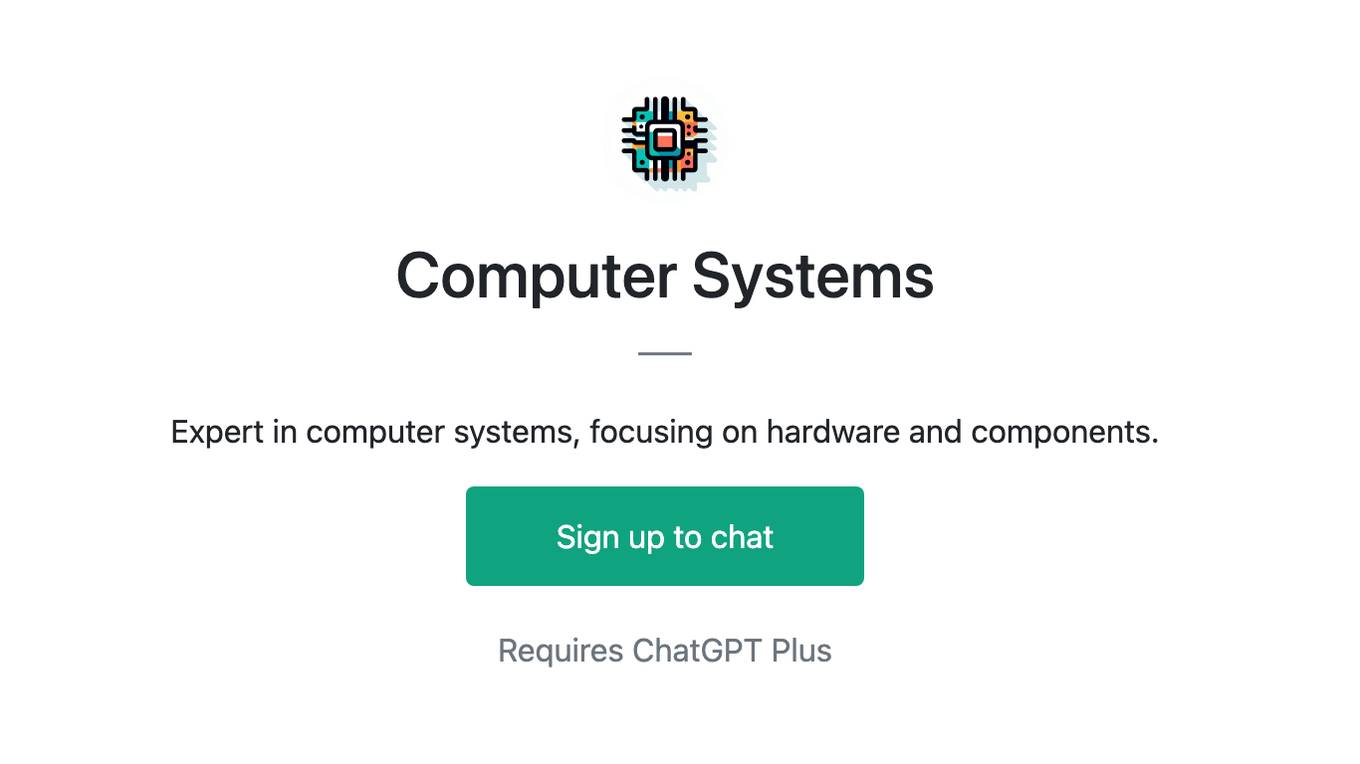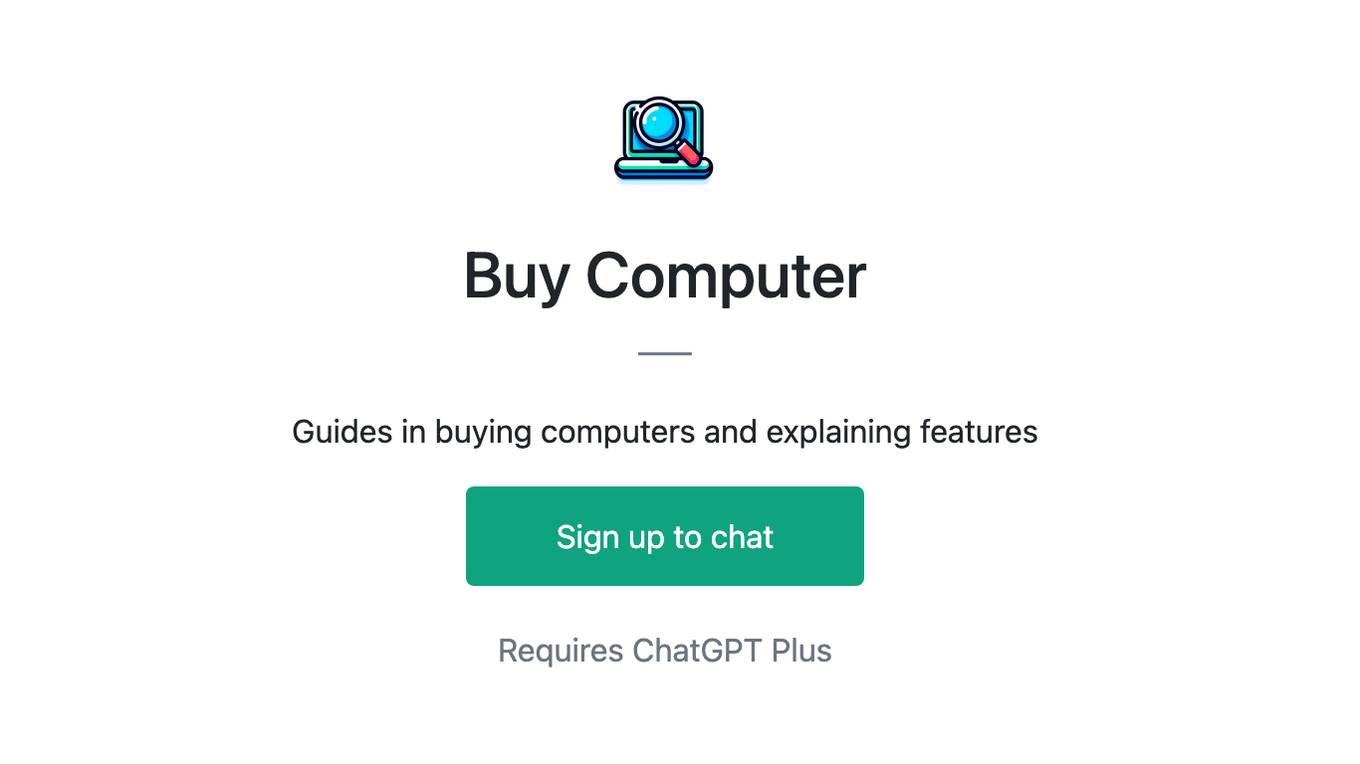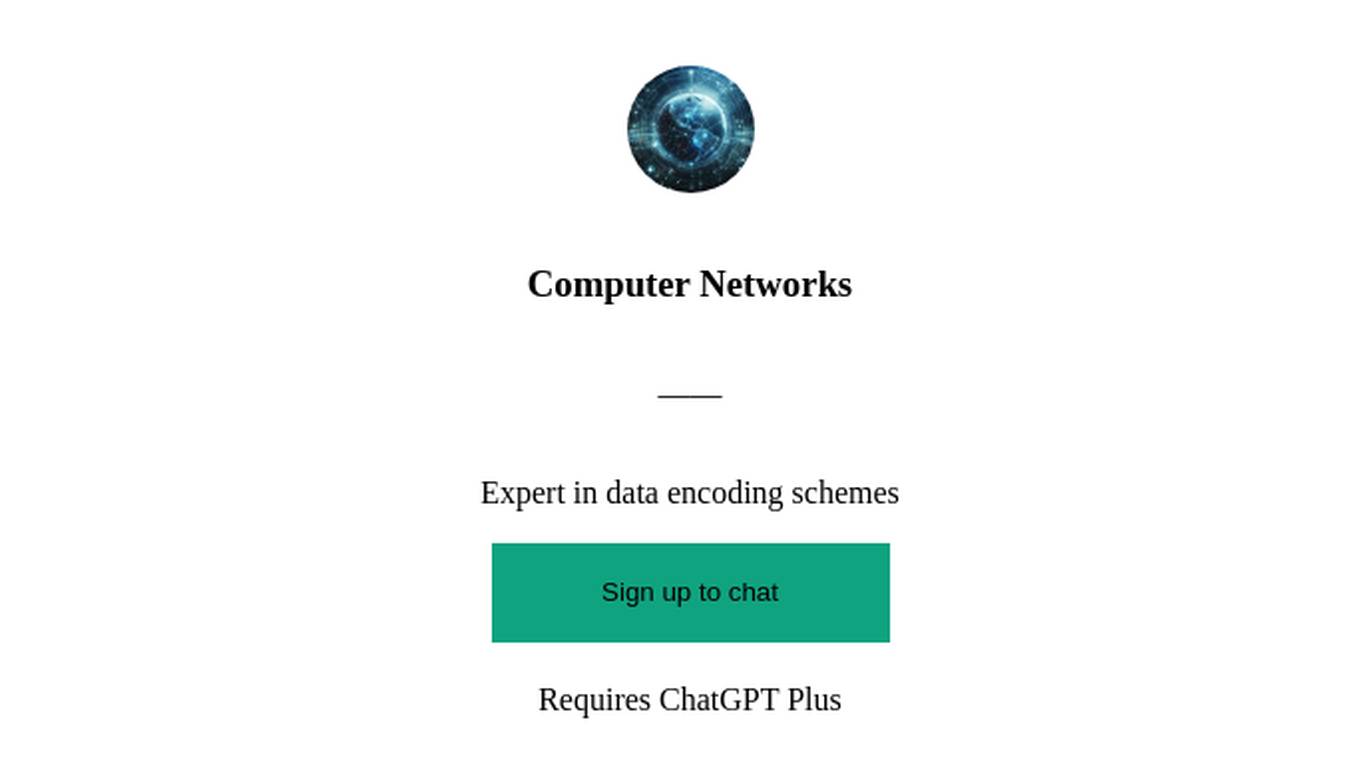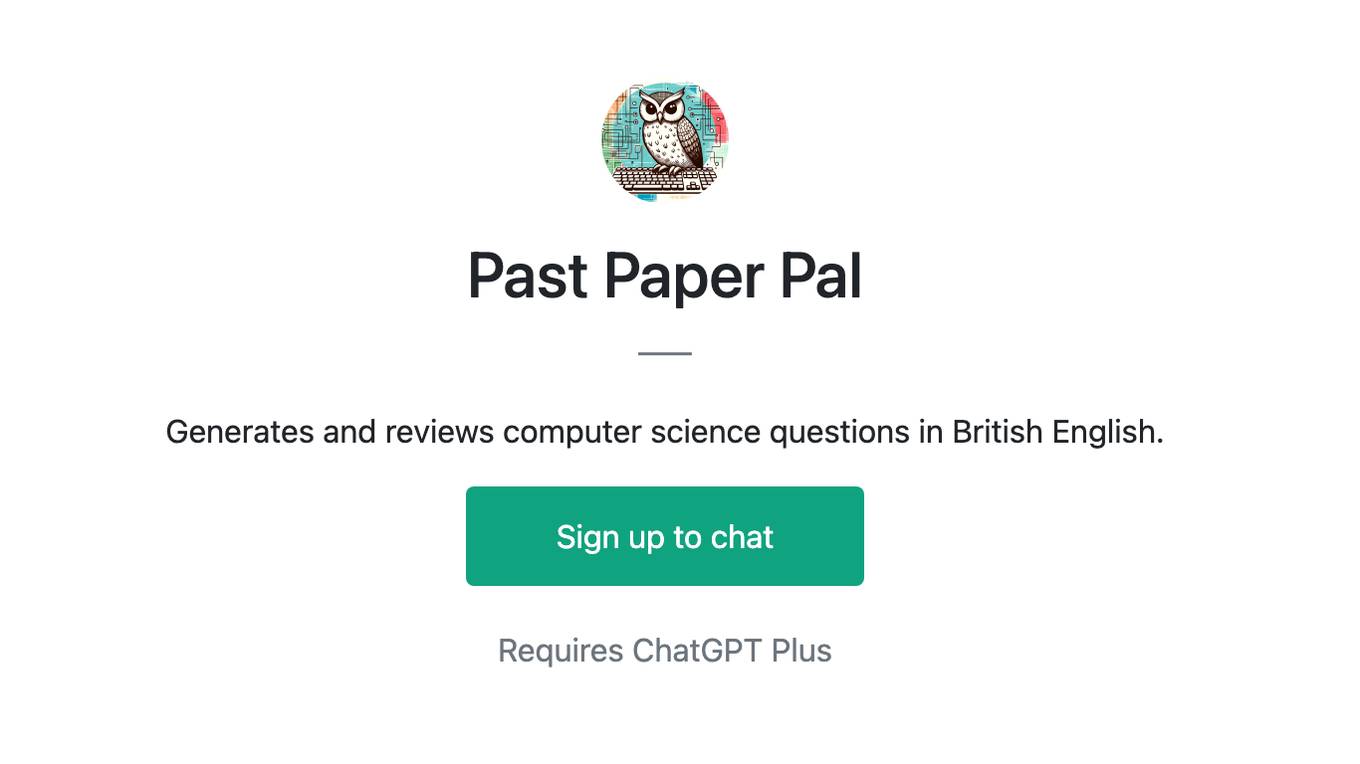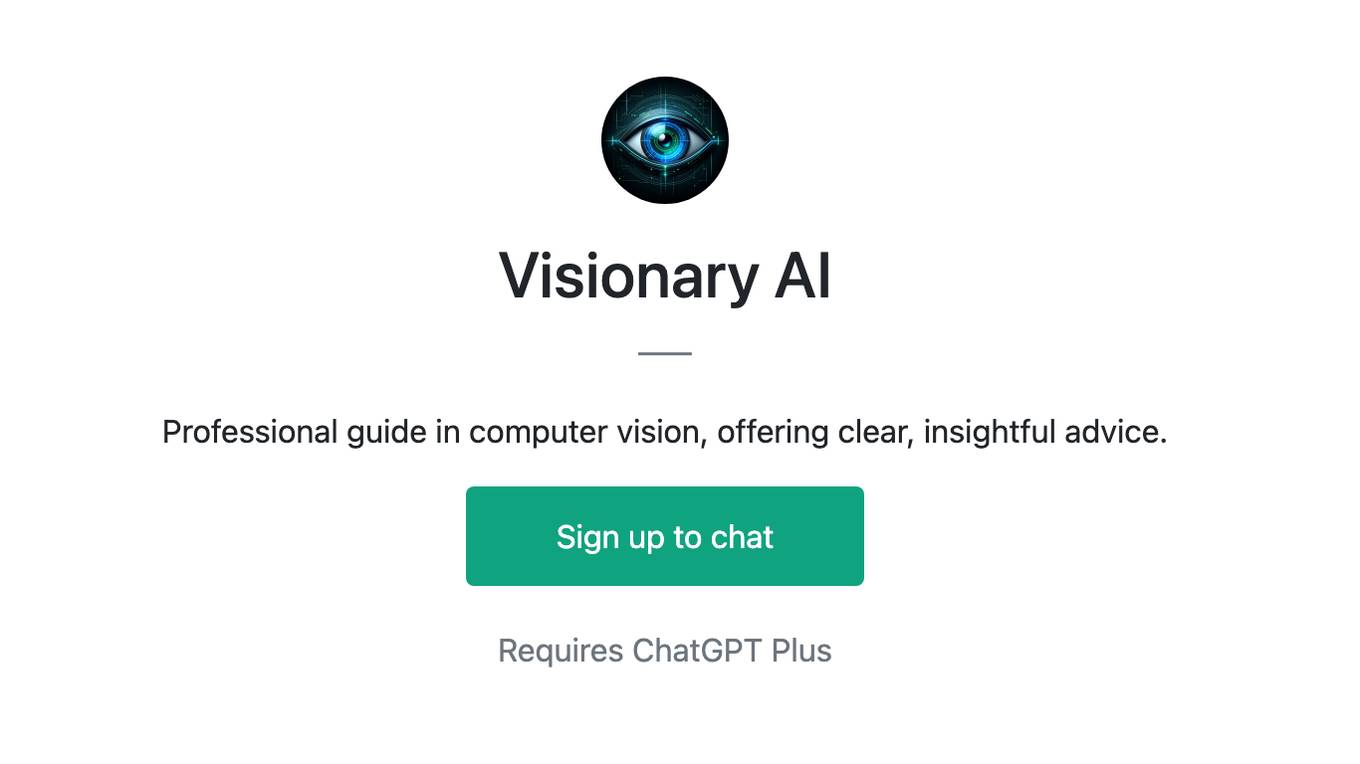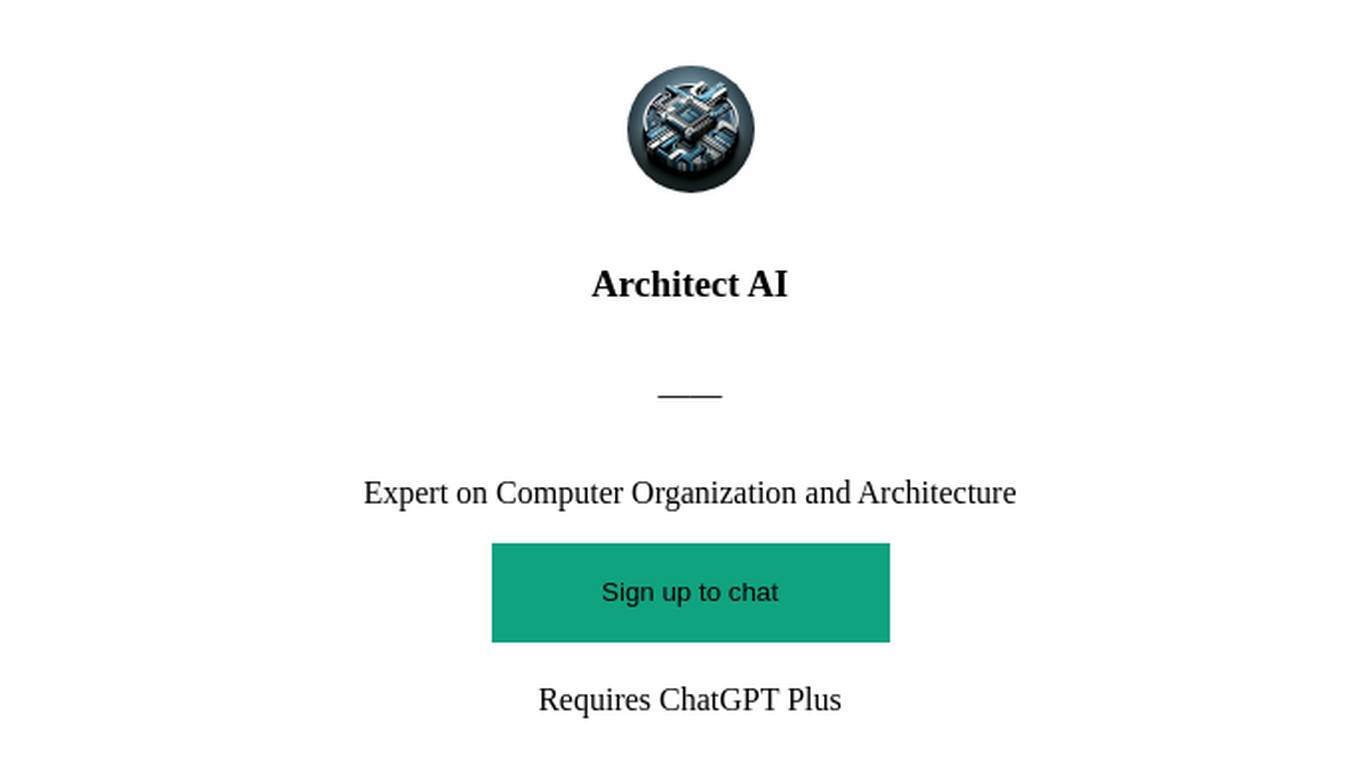Best AI tools for< Commuter >
Infographic
20 - AI tool Sites

Destination App
Destination App is the ultimate commuting companion that streamlines daily commutes by providing live arrival times, bus schedules, saved trips, route presets, community reports, AI integration, trip planner, and more. With support for over 800 transportation agencies, users can access real-time tracking, ETAs, personalized content powered by AI, and advanced iOS features for an enhanced commuting experience.
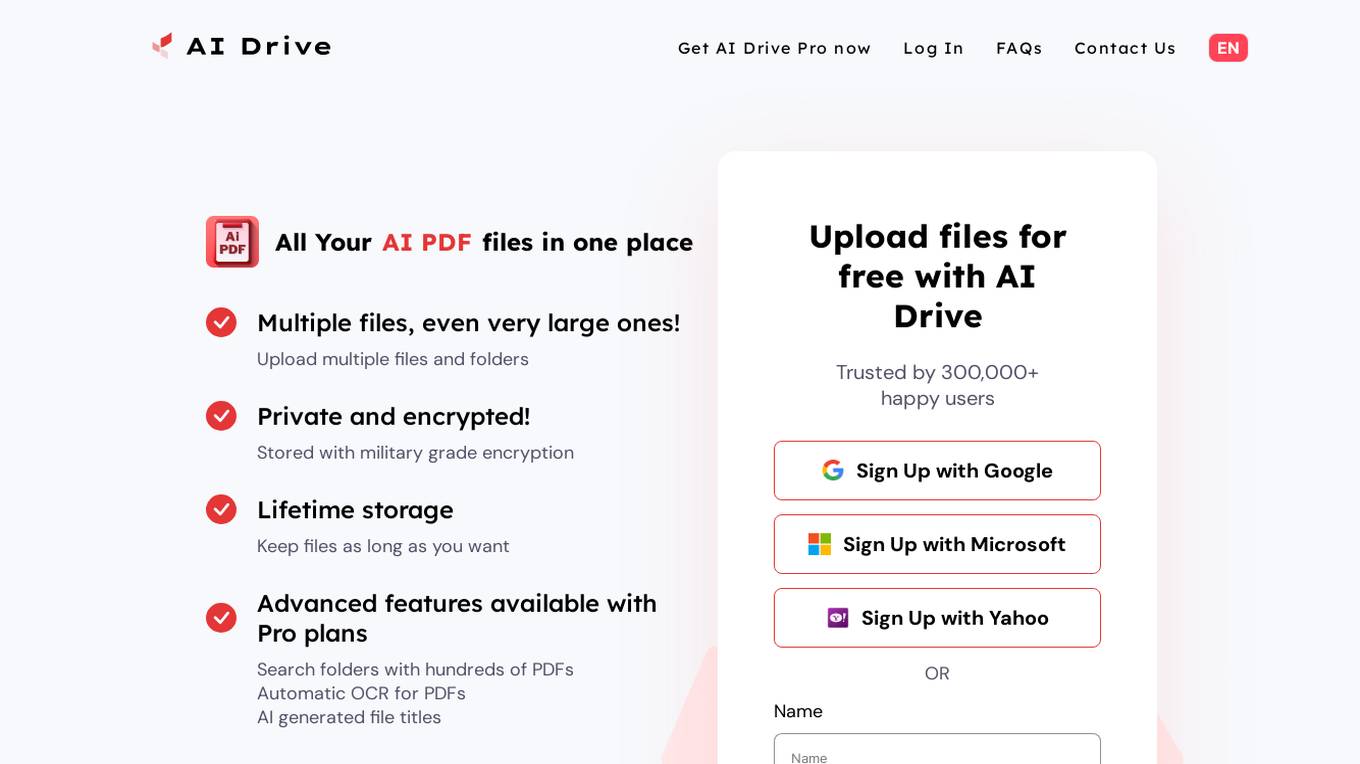
Ai Drive
Ai Drive is an innovative AI-powered tool designed to streamline and enhance the driving experience. It utilizes advanced algorithms and machine learning to provide real-time navigation, traffic updates, and personalized recommendations to optimize routes. With its intuitive interface and smart features, Ai Drive aims to revolutionize the way people navigate and commute, making driving safer, more efficient, and enjoyable.
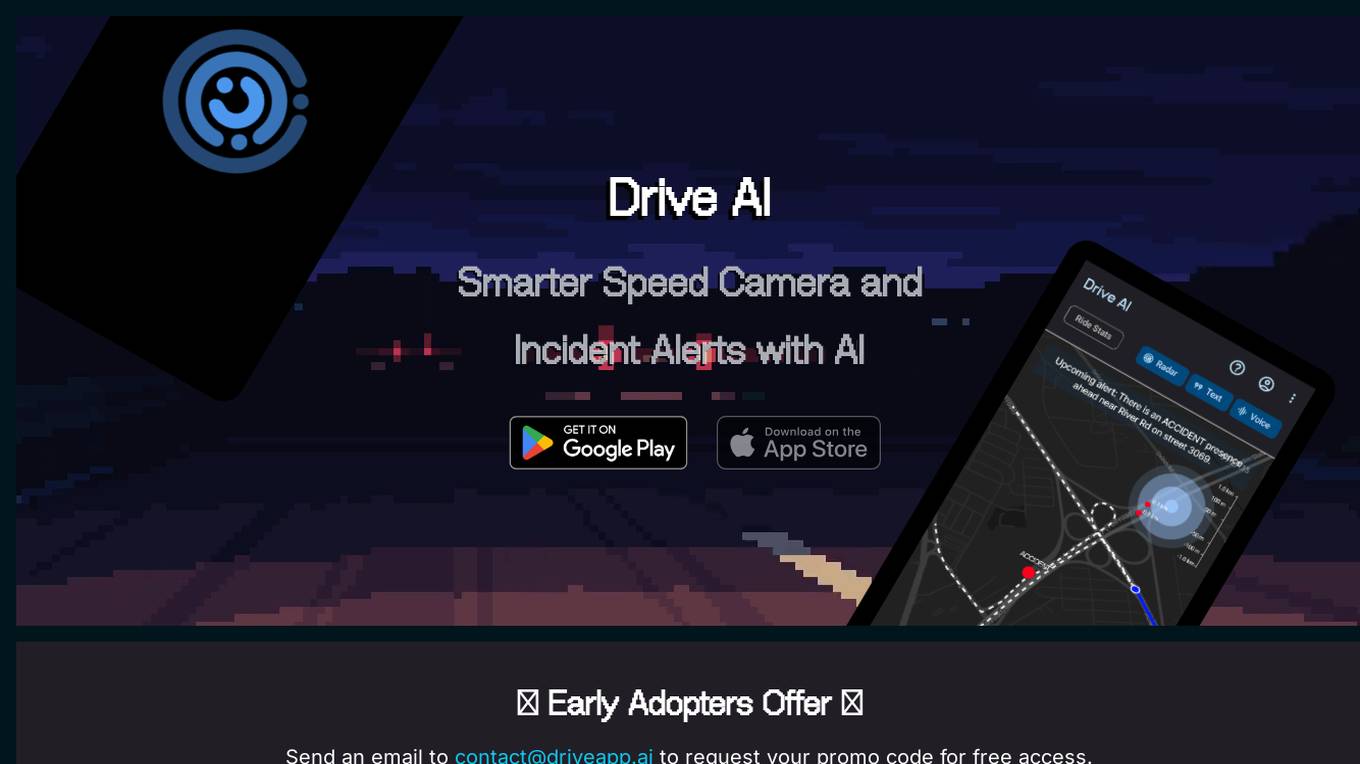
Drive AI
Drive AI is an AI-powered application designed to enhance driving experiences by providing real-time alerts, predictive route suggestions, and police presence notifications. The app aims to help users maintain safe driving speeds, avoid unnecessary stops, and stay informed about traffic conditions. By leveraging AI technology, Drive AI offers voice and text updates powered by ChatGPT, ensuring that users can receive alerts without distractions. With limited early adopter offers available, Drive AI is a valuable tool for drivers looking to navigate roads efficiently and safely.
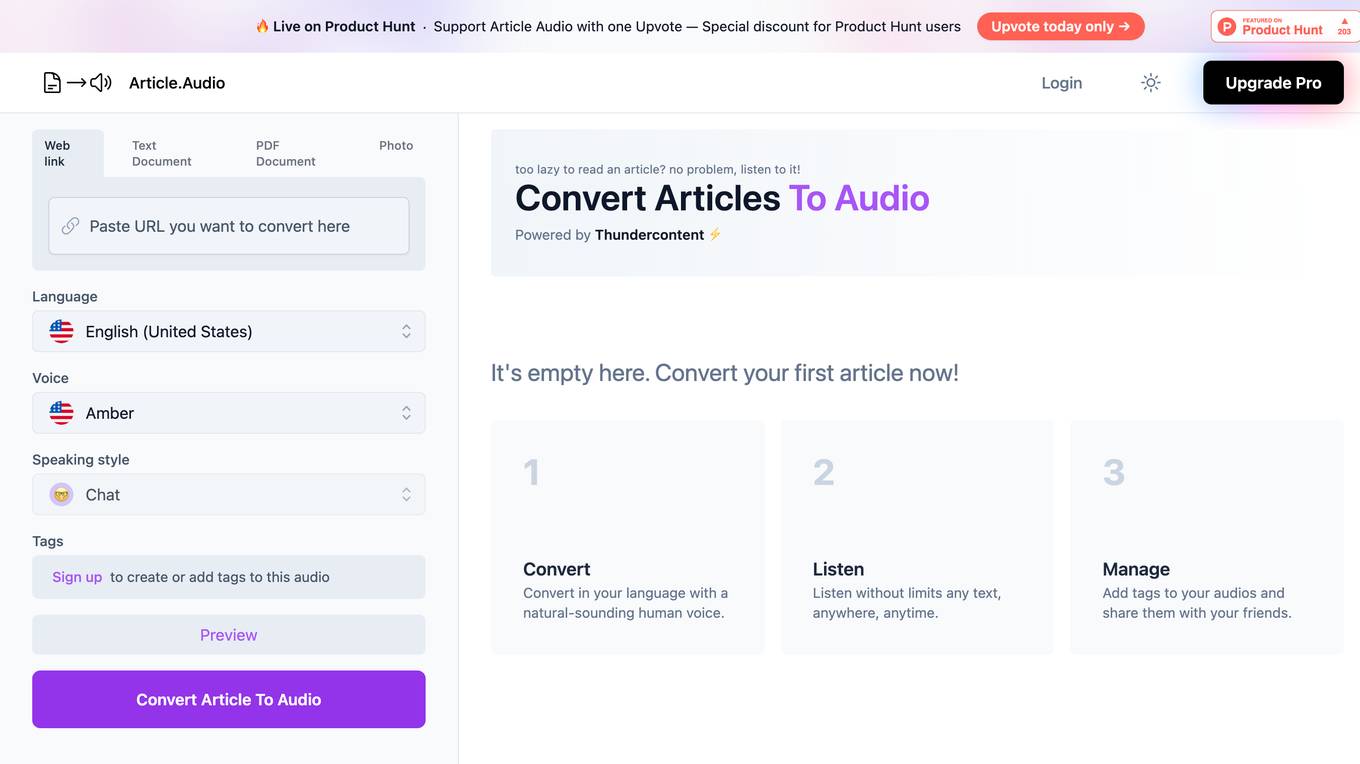
Article.Audio
Article.Audio is a web application that allows users to convert articles into audio files, enabling them to listen to the content instead of reading it. Users can easily convert text documents, PDFs, and web links into audio format using natural-sounding human voices. The application offers a user-friendly interface and supports multiple languages and voice styles. Article.Audio is powered by Thundercontent and aims to provide a convenient and accessible way for users to consume written content on the go.

AudioBook Bot
AudioBook Bot is an AI-powered application that converts text into spoken audio, providing users with the convenience of listening to books and other text-based content. The tool utilizes advanced natural language processing and speech synthesis technologies to create high-quality audio renditions. Users can simply input text, and the bot will generate an audio version that can be played on various devices. With its user-friendly interface and efficient processing capabilities, AudioBook Bot offers a seamless experience for those who prefer listening over reading.
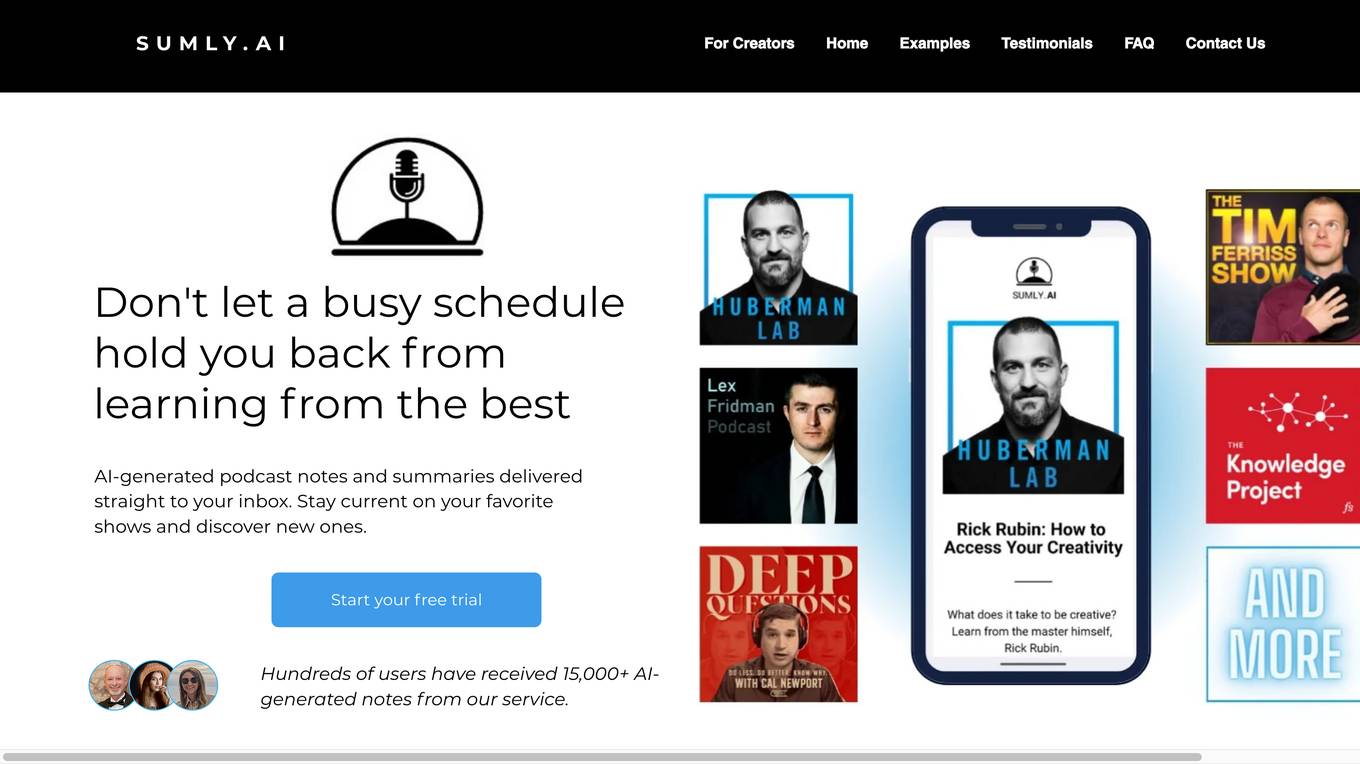
SumlyAI
SumlyAI is an AI-powered tool that generates podcast notes and summaries for busy individuals who want to stay updated on their favorite shows without having to listen to the entire episodes. The tool uses the latest AI technology to create high-quality summaries that are reviewed by humans to ensure accuracy and relevance. With SumlyAI, users can save time and easily catch up on podcasts, making it a convenient solution for podcast lovers with busy schedules.

Read It
Read It is an AI-powered tool that allows users to convert newsletters and articles into podcasts effortlessly. By utilizing cutting-edge AI text-to-speech technology, users can listen to their favorite written content on the go. The tool provides users with a personal podcast feed URL upon sign-up, enabling them to add articles through email forwarding or using a bookmarklet. With a user-friendly interface and pay-as-you-go model, Read It offers a seamless experience for turning text-based content into audio podcasts.

Computerworld
Computerworld is a technology news website that covers topics such as artificial intelligence, productivity software, Windows, Android, Apple, augmented reality, emerging technology, mobile, remote work, and operating systems. It provides news, reviews, how-tos, and analysis on the latest technology trends and products.
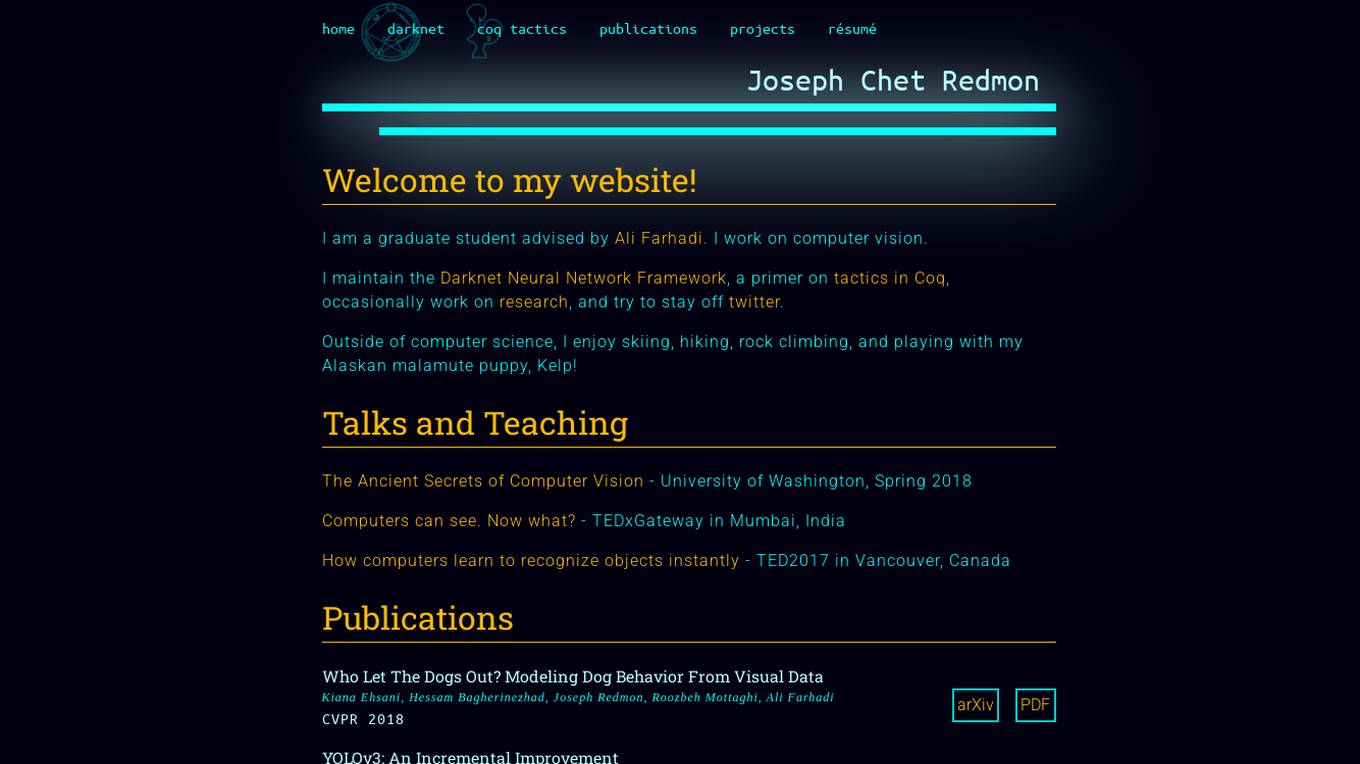
Joseph Chet Redmon's Computer Vision Platform
The website is a platform maintained by Joseph Chet Redmon, a graduate student working on computer vision. It features information on his projects, publications, talks, and teaching activities. The site also includes details about the Darknet Neural Network Framework, tactics in Coq, and research work. Visitors can learn about computer vision, object recognition, and visual question answering through the resources provided on the site.
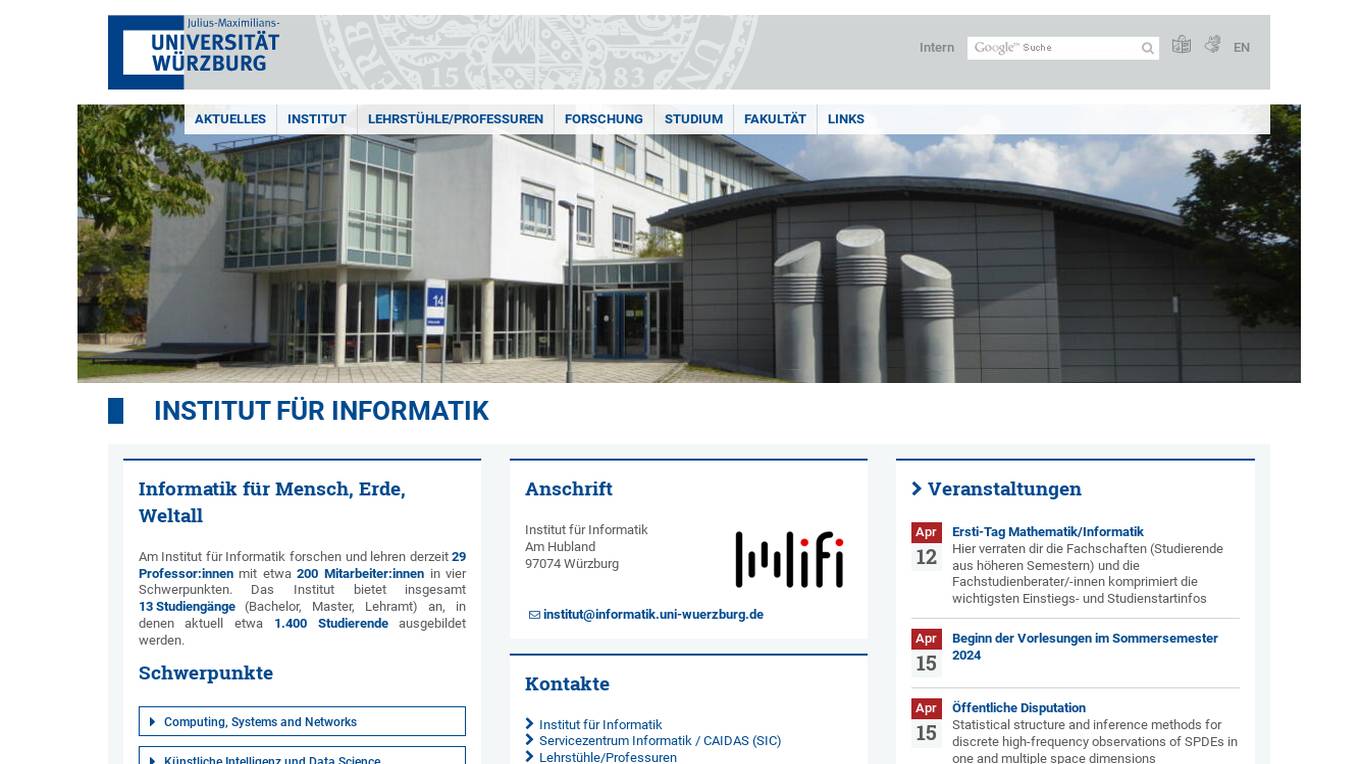
Institute of Computer Science, University of Würzburg
The Institute of Computer Science at the University of Würzburg is a leading research and teaching institution in the field of computer science. With 29 professors and around 200 employees, the institute offers a wide range of study programs, including bachelor's, master's, and teaching degrees. The institute's research focuses on four main areas: Computing, Systems and Networks; Artificial Intelligence and Data Science; Human-Centered Computing; and Aerospace and Robotics.

Japan Computer Vision (JCV)
Japan Computer Vision (JCV) is a leading technology company specializing in advanced computer vision solutions (image recognition). As a 100% subsidiary of SoftBank Corp., JCV focuses on security and innovation to provide cutting-edge technologies that transform industries and improve lives worldwide. Through solutions for smart buildings and smart retail, JCV enhances office environments, streamlines operations, improves hospitality in stores and commercial facilities, and creates new work and lifestyle experiences.
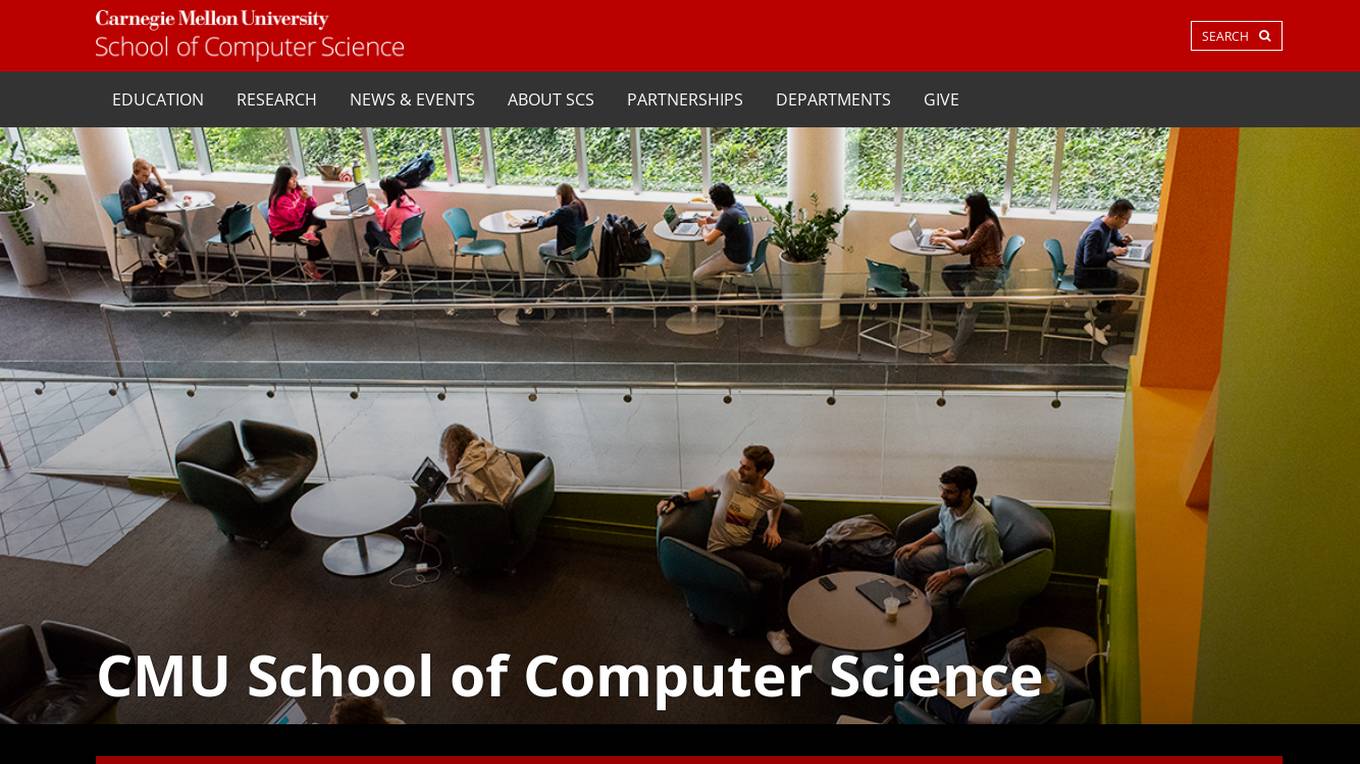
Carnegie Mellon University School of Computer Science
Carnegie Mellon University's School of Computer Science (SCS) is a world-renowned institution dedicated to advancing the field of computer science and training the next generation of innovators. With a rich history of groundbreaking research and a commitment to excellence in education, SCS offers a comprehensive range of programs, from undergraduate to doctoral levels, covering various specializations within computer science. The school's faculty are leading experts in their respective fields, actively engaged in cutting-edge research and collaborating with industry partners to solve real-world problems. SCS graduates are highly sought after by top companies and organizations worldwide, recognized for their exceptional skills and ability to drive innovation.

Pinokio
Pinokio is a browser that enables users to easily install, run, and programmatically control various AI applications with just one click. It provides a platform for exploring, learning, and sharing scripts created by the community. Pinokio supports a wide range of AI tools and applications for tasks such as video editing, image manipulation, text-to-speech, image generation, and more.

Room AI
Room AI is an AI interior design tool that allows users to design their dream home with professional interior designs using easy-to-use AI software. Users can restyle existing rooms or generate new room designs from scratch, choose colors and materials, and visualize different design possibilities. The tool caters to homeowners, interior designers, real estate agents, and architects, offering a user-friendly interface with customization options and suggestions. Room AI collaborates with users and industry experts to provide a comprehensive interior design solution.
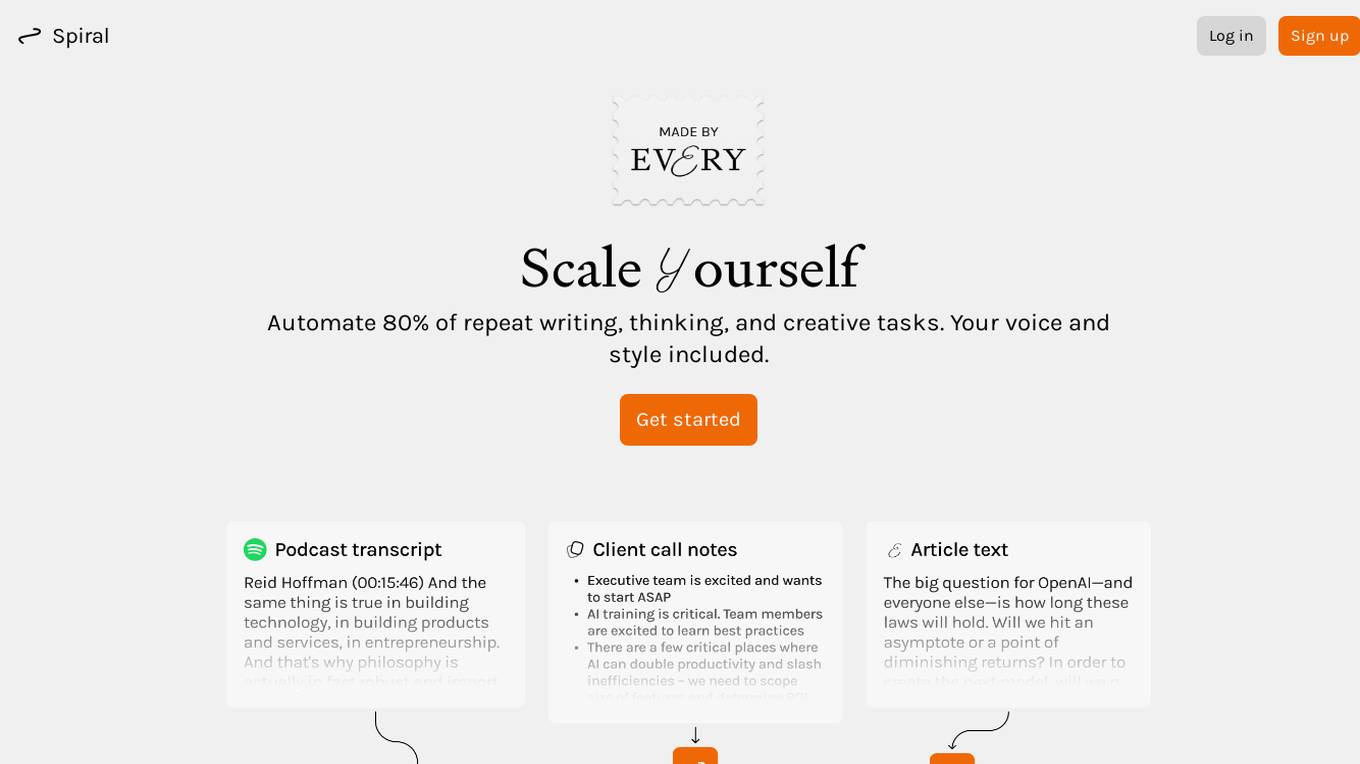
Spiral
Spiral is an AI-powered tool designed to automate 80% of repeat writing, thinking, and creative tasks. It allows users to create Spirals to accelerate any writing task by training it on examples to generate outputs in their desired voice and style. The tool includes a powerful Prompt Builder to help users work faster and smarter, transforming content into tweets, PRDs, proposals, summaries, and more. Spiral extracts patterns from text to deduce voice and style, enabling users to iterate on outputs until satisfied. Users can share Spirals with their team to maximize quality and streamline processes.
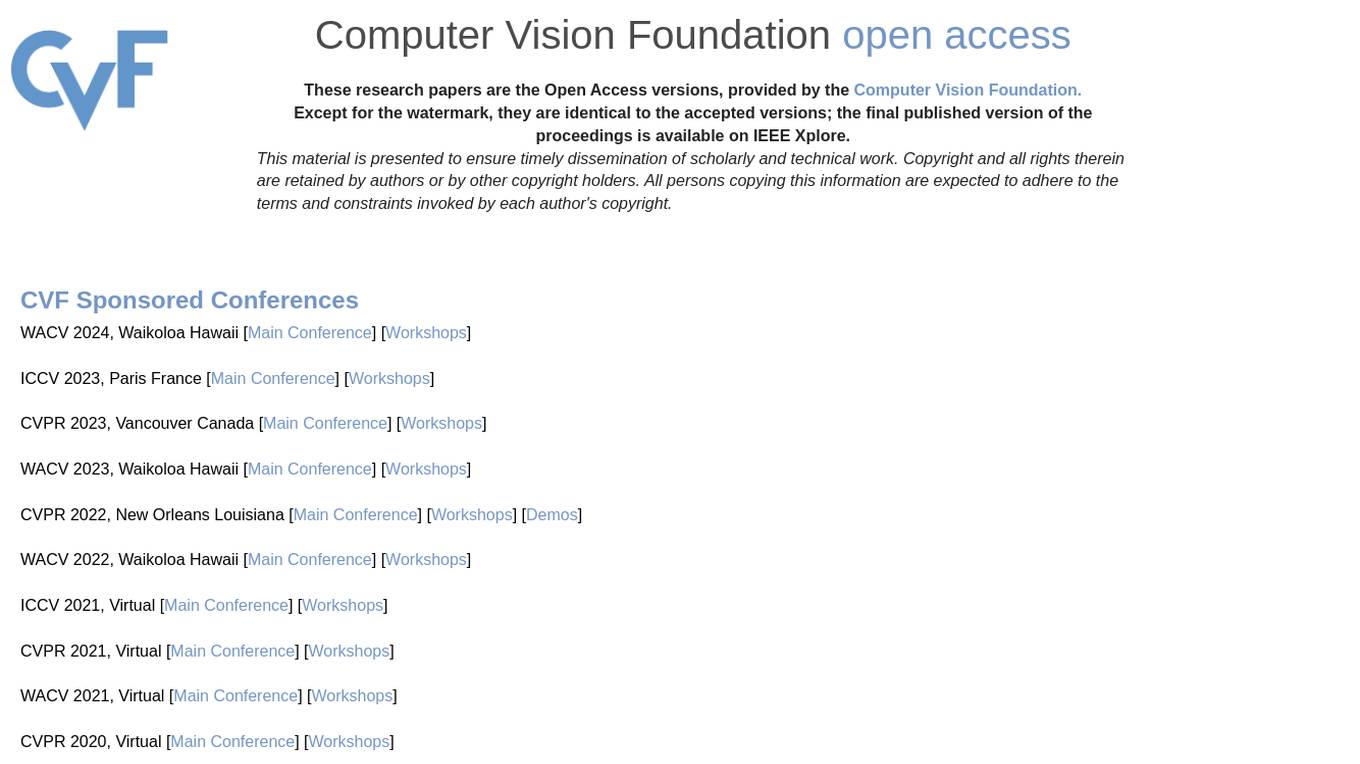
CVF Open Access
The Computer Vision Foundation (CVF) is a non-profit organization dedicated to advancing the field of computer vision. CVF organizes several conferences and workshops each year, including the International Conference on Computer Vision (ICCV), the Conference on Computer Vision and Pattern Recognition (CVPR), and the Winter Conference on Applications of Computer Vision (WACV). CVF also publishes the International Journal of Computer Vision (IJCV) and the Computer Vision and Image Understanding (CVIU) journal. The CVF Open Access website provides access to the full text of all CVF-sponsored conference papers. These papers are available for free download in PDF format. The CVF Open Access website also includes links to the arXiv versions of the papers, where available.
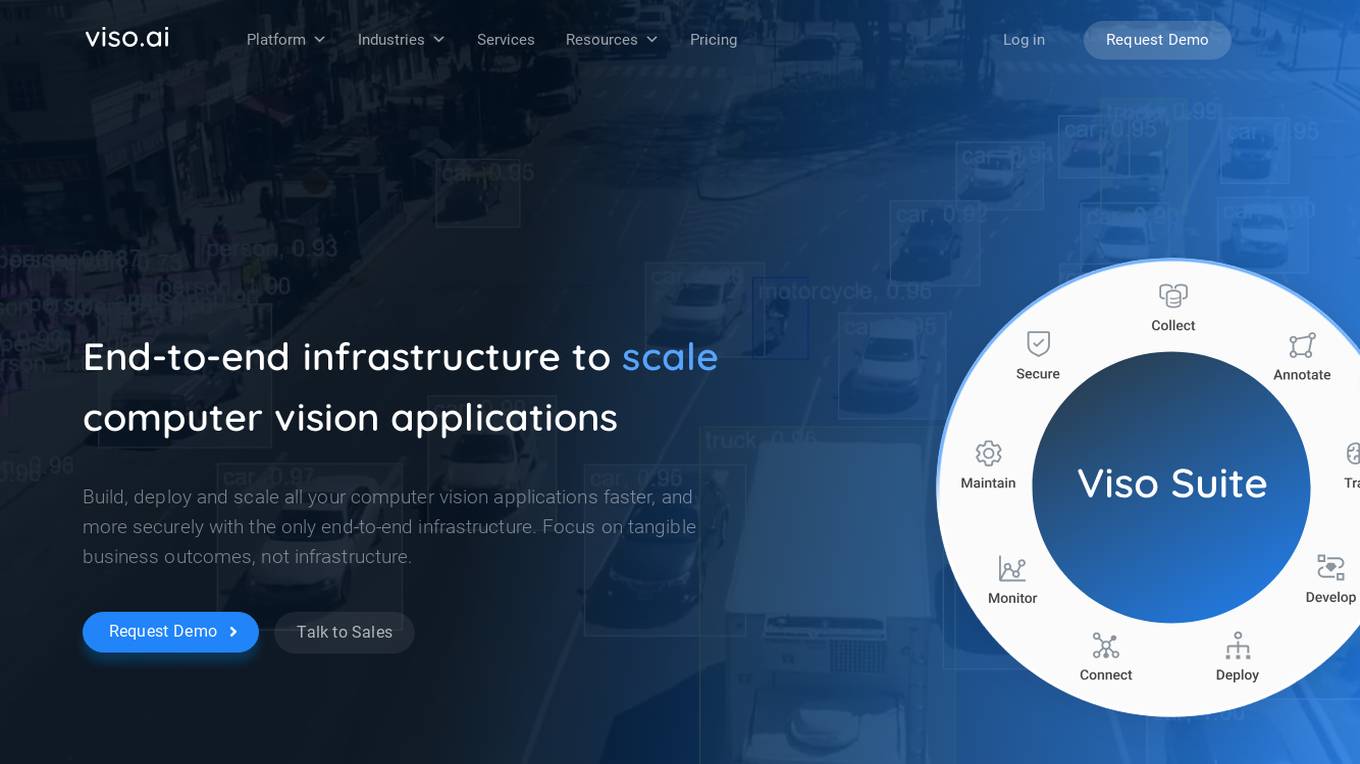
Viso Suite
Viso Suite is a no-code computer vision platform that enables users to build, deploy, and scale computer vision applications. It provides a comprehensive set of tools for data collection, annotation, model training, application development, and deployment. Viso Suite is trusted by leading Fortune Global companies and has been used to develop a wide range of computer vision applications, including object detection, image classification, facial recognition, and anomaly detection.
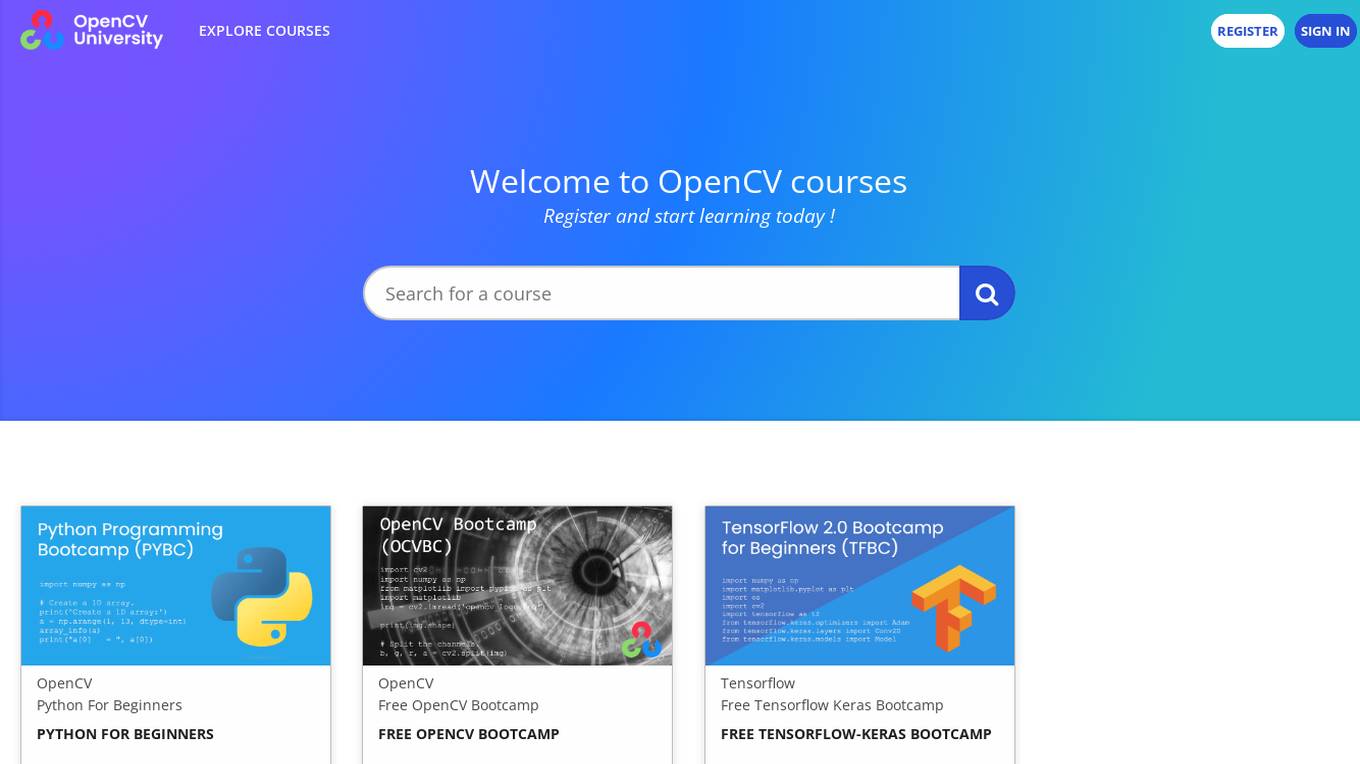
OpenCV
OpenCV is a library of programming functions mainly aimed at real-time computer vision. Originally developed by Intel, it was later supported by Willow Garage and is now maintained by Itseez. OpenCV is cross-platform and free for use under the open-source BSD license.
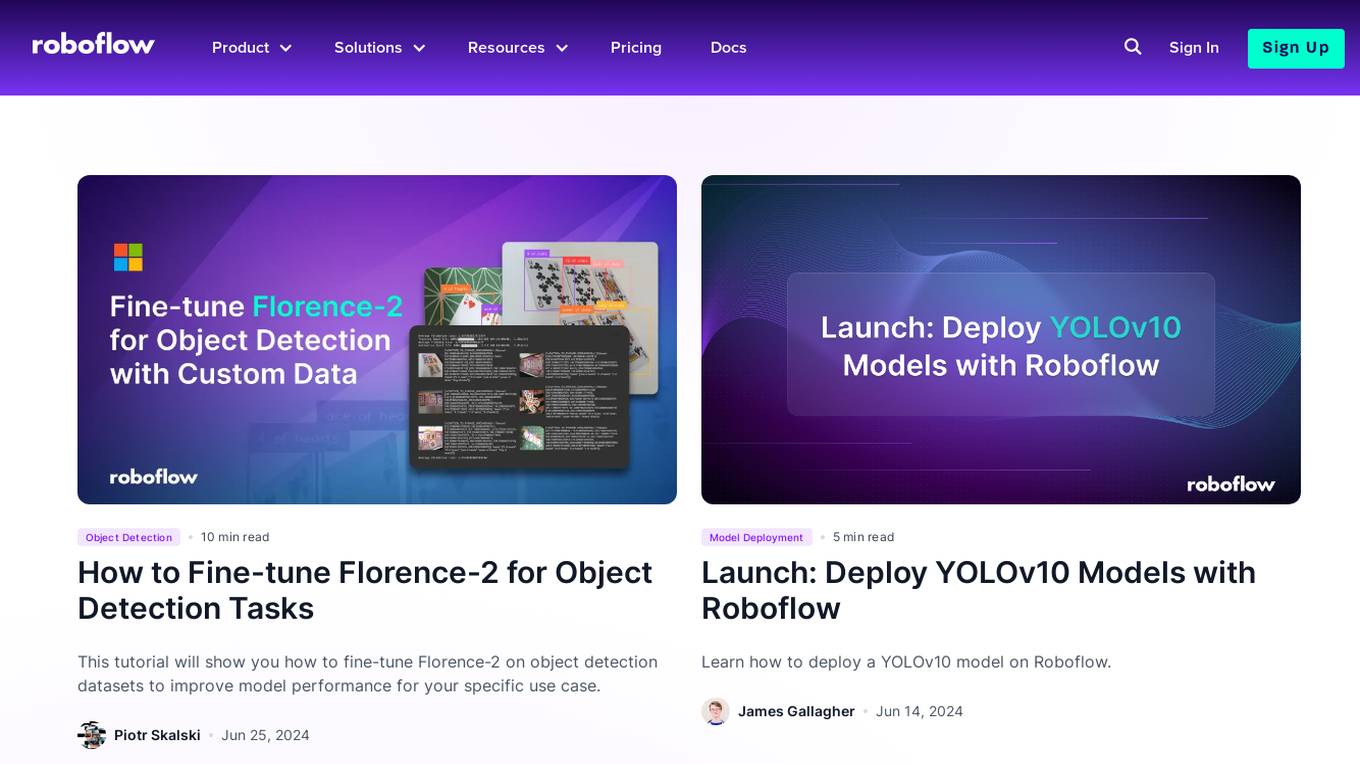
Roboflow
Roboflow is an AI tool designed for computer vision tasks, offering a platform that allows users to annotate, train, deploy, and perform inference on models. It provides integrations, ecosystem support, and features like notebooks, autodistillation, and supervision. Roboflow caters to various industries such as aerospace, agriculture, healthcare, finance, and more, with a focus on simplifying the development and deployment of computer vision models.
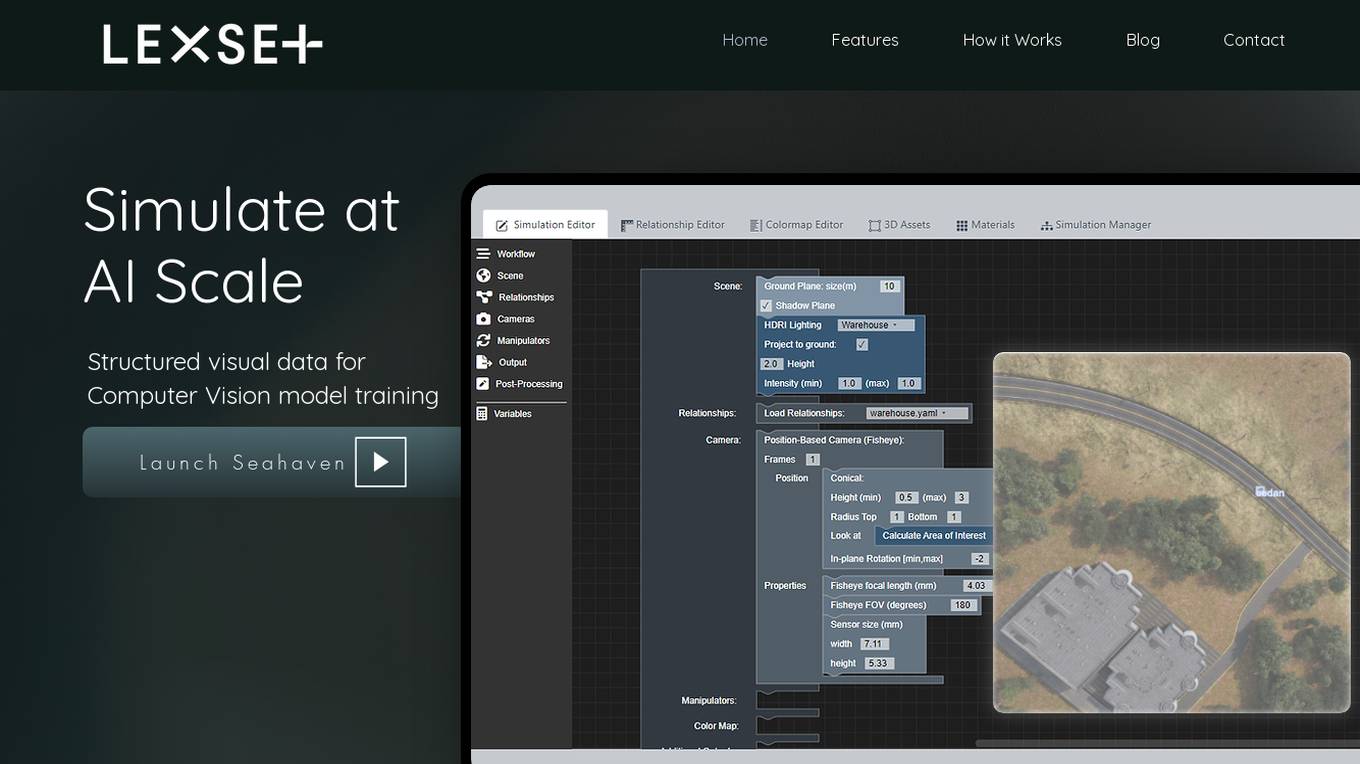
Lexset
Lexset is an AI tool that provides synthetic data generation services for computer vision model training. It offers a no-code interface to create unlimited data with advanced camera controls and lighting options. Users can simulate AI-scale environments, composite objects into images, and create custom 3D scenarios. Lexset also provides access to GPU nodes, dedicated support, and feature development assistance. The tool aims to improve object detection accuracy and optimize generalization on high-quality synthetic data.
0 - Open Source Tools
20 - OpenAI Gpts

The Greatest Computer Science Tutor
Get help with handpicked college textbooks. Ask for commands. Learn theory + code simultaneously.
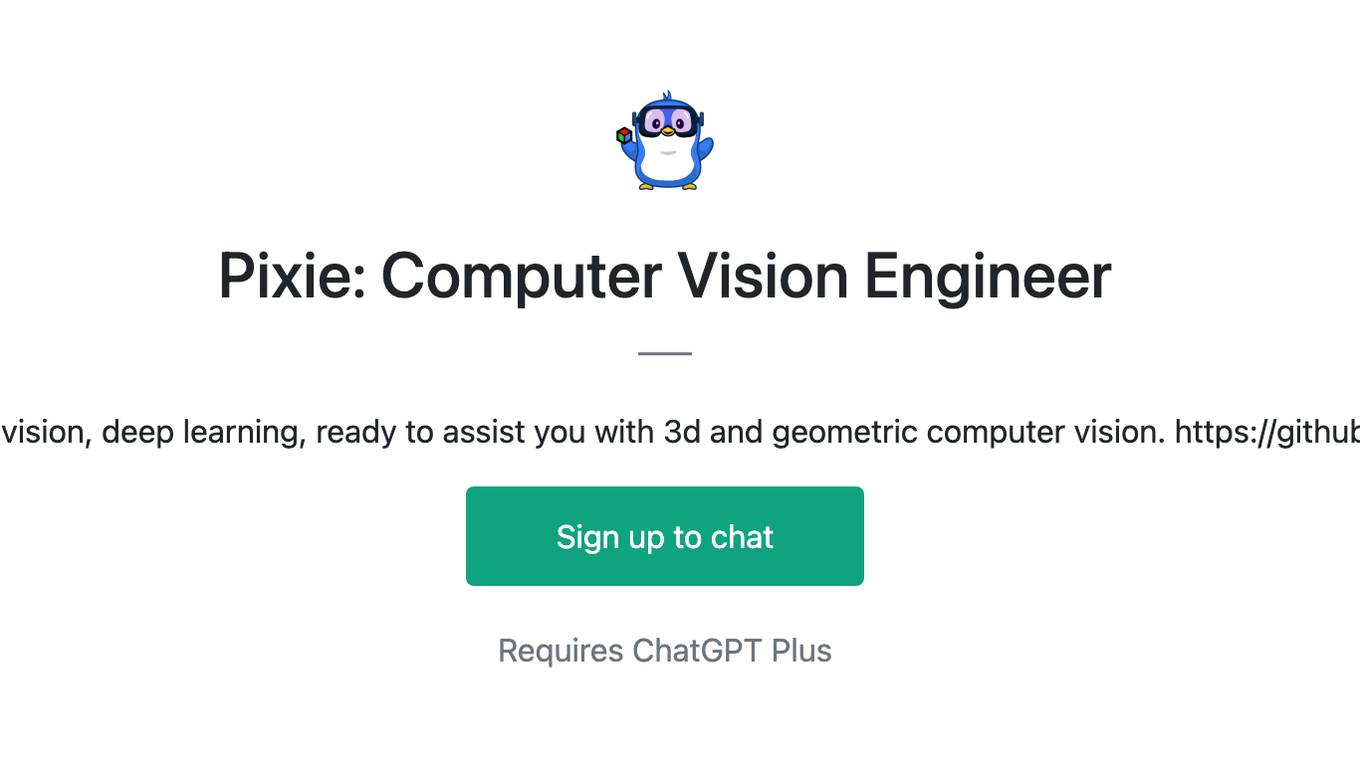
Pixie: Computer Vision Engineer
Expert in computer vision, deep learning, ready to assist you with 3d and geometric computer vision. https://github.com/kornia/pixie

How To Make Your Computer Faster: Speed Up Your PC
A Guide To Speed Up Your Computer from Geeks On Command Computer Repair Company

HackMeIfYouCan
Hack Me if you can - I can only talk to you about computer security, software security and LLM security @JacquesGariepy

Desktop Value
Valuating custom computer hardware. Copyright (C) 2023, Sourceduty - All Rights Reserved.
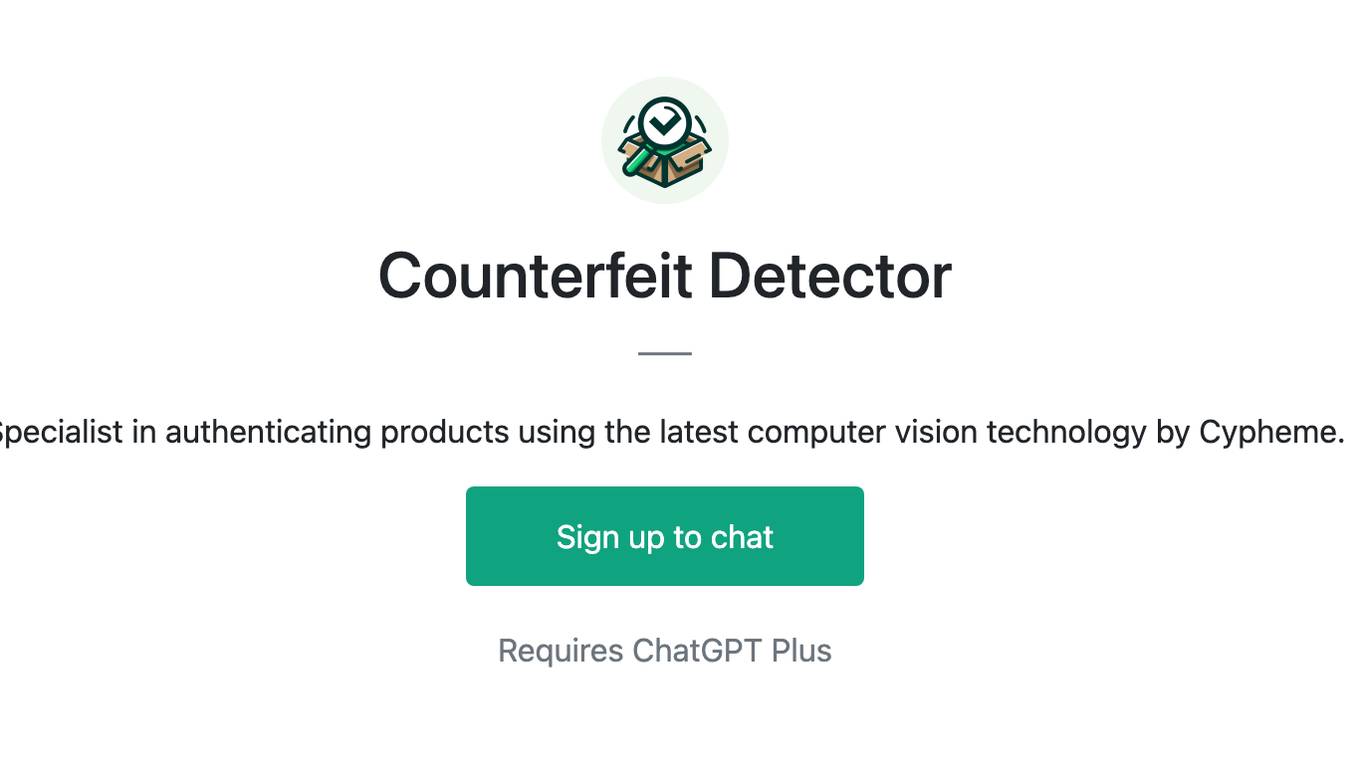
Counterfeit Detector
Specialist in authenticating products using the latest computer vision technology by Cypheme.
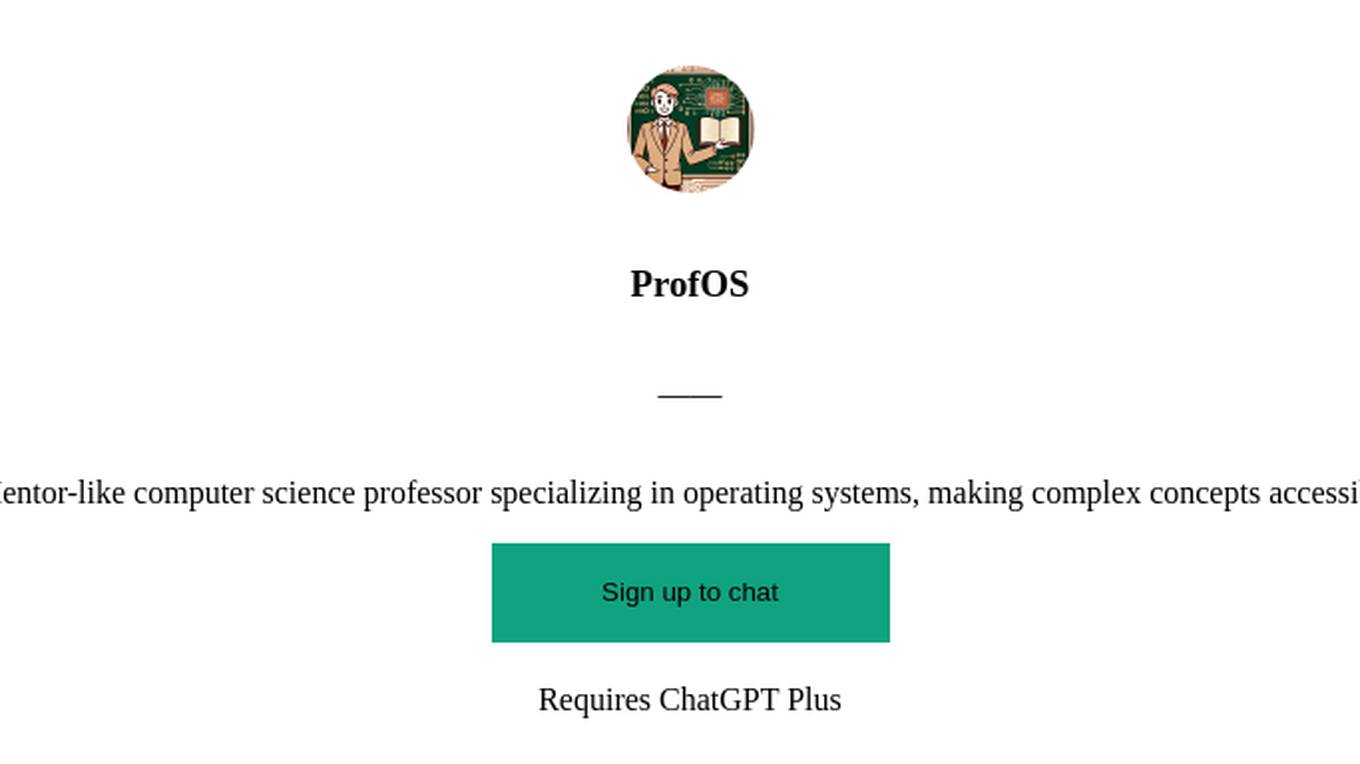
ProfOS
Mentor-like computer science professor specializing in operating systems, making complex concepts accessible.


